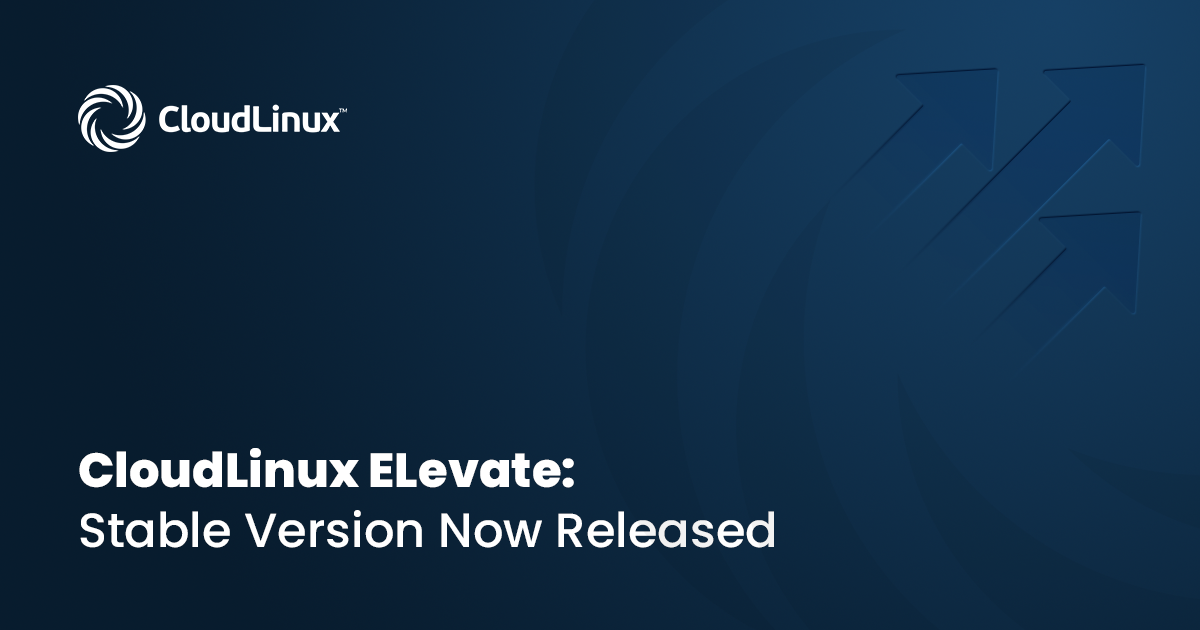CloudLinux ELevate: Stable Version Now Released. Simplified Transitioning from CloudLinux 7 to 8

CloudLinux proudly announces the stable release of ELevate, making it easier for users to transition from CloudLinux 7 to CloudLinux 8. With enhanced features and refinements, ELevate ensures a smooth migration journey for hosting providers. Learn more about ELevate here.
Note: Even after the stable release, ELevate represents a significant alteration to the operating system's structure and carries potential risks. Therefore, making a full server backup before initiating the ELevate process is crucial to ensure the server's recovery and functionality should any issues arise.
Key Features and Improvements in Stable Release
The journey from Beta to Stable release of ELevate has seen major enhancements, all aimed at simplifying the migration from CloudLinux 7 to 8. Here are the most
-
Reduced Minimum Memory Requirements for cPanel Systems: We have optimized memory usage to accommodate systems with lower resources. This adjustment ensures that more cPanel systems can smoothly transition to CloudLinux 8 without the need for hardware upgrades.
-
Disabling Rollout Repositories During Upgrade: To ensure a seamless upgrade process without authentication errors, ELevate now temporarily disables the use of rollout repositories. This measure prevents potential conflicts and authentication issues, facilitating a smoother migration experience.
-
Automatic Clearance of Conflicting Files from OpenSSL Libraries: ELevate has been enhanced to automatically identify and resolve conflicts with OpenSSL libraries, a critical improvement that mitigates potential security vulnerabilities and compatibility issues during the migration.
-
Custom Migration Logic for MySQL Governor and Upstream MySQL/MariaDB Versions: ELevate now incorporates tailored migration logic for systems using MySQL Governor-provided MySQL/MariaDB versions, as well as upstream versions. This custom logic ensures that all provided DB versions transition seamlessly to the corresponding CL8 versions, preserving data integrity and performance.
-
Modification of the CLN Channel Switching Logic: The CloudLinux Network (CLN) channel switching logic has been refined to prevent premature OS version switches during migration. This ensures that the system does not begin pulling update packages from the wrong repositories if the process is interrupted halfway.
- Integration of the CLN-based channels into the upgrade process: The packages delivered via the CLN-based CloudLinux repositories now can be utilized during the system upgrade in order to ensure the resulting system state is fully up-to-date.
-
Integration of the cPanel-Provided elevate-cpanel Script: For CloudLinux systems equipped with cPanel, ELevate leverages the cPanel-provided elevate-cpanel script, enhancing compatibility and simplifying the migration steps for cPanel users.
The previously-used elevate-cpanel fork with CloudLinux-specific modifications has been deprecated with the introduction of CloudLinux support in the official cPanel-provided script.Note that this means that the URL for the script download has been changed to the official cPanel repository. Please update your configurations/automation scripts accordingly.
-
Adjusted Leapp Configuration for AlmaLinux 8 RPM-GPG Keys: Addressing a specific challenge encountered with AlmaLinux 8 RPM-GPG keys on CloudLinux 7, ELevate’s Leapp configuration has been adjusted to ensure that these keys are correctly utilized, securing package verification and system integrity post-migration.
To recall what was edited in Release Candidate #2, please review our previous blog post.
How to Migrate
Migrating your CloudLinux 7.X system to CloudLinux 8.X using ELevate is a straightforward process. Find detailed instructions here:
As always, please make sure to fully back up your servers before initiating the upgrade - the full server upgrade remains an inherently unstable procedure.







